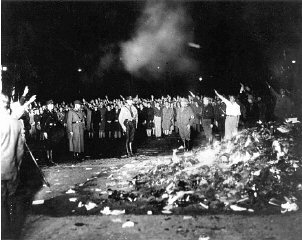 |
| Nazi party at a mass book burning. |
Ever since the invention of the printing press, the practice of burning books to censor literature became symbolic of censorship and information control. Forty years after the printing press was invented in Germany, the country's first official censorship office opened to suppress what religious authorities labeled "dangerous publications."
In the United States, the first book ban happened in Springfield, Mass in 1650. Stranglely, it was done by the Puritans, who had fled England to escape religious persecution, yet they condemned and confiscated a religious text written by one of their own members and had it burned in a public demonstration in the center of town.
Censorship and book bans were often supported at the national level in the United States. Federal laws, such as the Comstock Law of 1873, made it a crime to distribute "obscene, lewd, and/or lascivious" materials through the mail. The banning, and often burning, of books continued until the early 1920s when existing standards were challenged. The tide turned against national laws and judgments during the 1930s as Americans witnessed the disturbing activities in Nazi Germany surrounding censorship and mass book burnings.
I never thought of the irony of the Puritan book burning.
ReplyDeleteturn on comment moderation
ReplyDeleteI like your topic and how you used different examples than the usual ones, its very interesting. Also, I think that censorship is horrible because it is wrong for the government to decide which ideas are acceptable and which aren't.
ReplyDeleteThis is really interesting. I like how you incorporated a lot of different information into your blog.
ReplyDeleteI really like this topic. Your wide use of information really made a boring topic interesting.
ReplyDeleteBanning books is ridiculous. Let the people read. Who cares about the message, it's all about how the book is received.
ReplyDelete